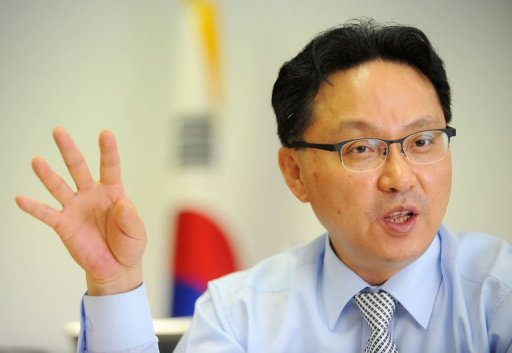Less than a year after becoming the first North Korean defector to take a senior government post in South Korea, Cho Myung-Chul is set to win office as the country’s first defector lawmaker.
Cho, who is standing for the ruling conservative New Frontier Party (NFP) in the April 11 parliamentary poll, says his victory would send a message both to his former homeland and to fellow refugees struggling to adapt in the South.
Cho, a one-time member of that elite who grew disillusioned with the regime, seems almost certain to be elected after being ranked fourth in the NFP’s list of proportional representation candidates.
Electors vote directly for 246 legislators, while 54 seats are awarded on a proportional representation basis depending on the level of support for each party. The aim is to diversify the background of legislators.
More than 23,500 North Koreans have fled their impoverished communist homeland and come to South Korea since the 1950-1953 war, the vast majority in recent years.
Despite government cash support and a mandatory three-month stay in a resettlement centre after they arrive, many struggle to adapt to a bewildering competitive capitalist nation.
Cho, 53, formerly the head of the state-run Education Centre for Unification, said he was prompted to stand by recent events including the controversy over China’s policy of repatriating fugitives from the North.
The Pyongyang regime, he said, viewed defectors as social outcasts because South Koreans were unwilling to share their economic pie. “But my case will prove them wrong and it will be a hard blow to them.”
Unlike many escaping hunger or poverty, Cho had little material reason to flee his homeland.
His father was construction minister and his mother a professor. As the child of top officials, he attended middle and high school with siblings of the late leader Kim Jong-Il.
Cho became a professor at the top academic institution, Kim Il-Sung University, but became jaded with the ideological education. He fled to the South via a third country while he was an exchange professor in China in 1994.
Cho worked at a state-run think-tank as a researcher until he was appointed to direct the education centre last June.
If elected, he pledges to review policies on supporting refugees in terms of housing, education, health, human rights and social activities.
The North is bitterly hostile to the government of President Lee Myung-Bak, who scrapped the “sunshine” aid and engagement policy of his left-leaning predecessors.
Cho for his part criticises the policy of the main left-leaning opposition Democratic United Party (DUP).

COMMENTS
Please let us know if you're having issues with commenting.